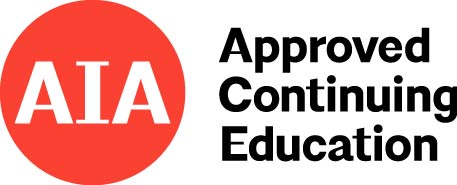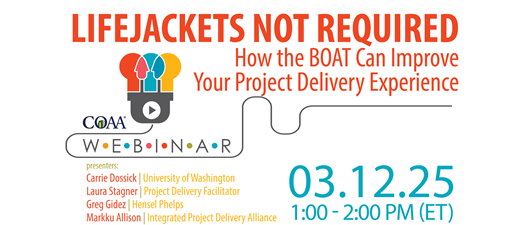Lifejackets Not Required - How the BOAT can Improve Your Project Delivery Experience
Zoom
Event Details
Lifejackets Not Required
How the BOAT Can Improve Your Project Delivery Experience
How an organization makes decisions can greatly impact the project delivery success. That seems intuitive but now there’s a research-based tool that correlates an Owner organization’s decision-making structure and culture with various project delivery methods (design-bid-build, CMAR, design-build, etc.). Why? To help understand and plan for challenges before they occur, which will inevitably happen when an organization uses a delivery method that clashes with its approach to making decisions.
The Building Owner’s Assessment Tool (BOAT), developed by University of Washington researchers, helps Owners to better understand their decision-making profile. The results can then be used by the Owner and their project teams to proactively establish management expectations and mitigate roadblocks and pain points. Beyond that primary goal, it also signals to service providers that the Owner is vulnerable and transparent enough to look inward and collaboratively plan around its own shortcomings. #TheCOAAWay
Learn from the developers of this unique and effective tool how it works and how it can help improve your project outcomes.
Learning Objectives
- Understand the correlation between an Owner’s decision-making structure & culture and project success or failure.
- Explore the research behind the Building Owner’s Assessment Tool (BOAT), which was developed by the University of Washington to help Owners and their project teams predict and offset project management challenges.
- Review the questions posed within the BOAT and learn how the answers lead to a “decision-making profile” for the responding organization.
- Learn how this profile is then overlaid on various project delivery methods to reveal likely challenges or risks, which can then lead to a collaborative approach to offsetting or mitigating those risks.
Approved for 1 AIA LU
Presenters

Carrie Sturts Dossick, Ph.D., P.E.
Carrie Sturts Dossick, Ph.D., P.E. is a Schaufelberger Professor of Construction Management and the Associate Dean of Research in the College of Built Environments, University of Washington. Dr. Dossick also holds an adjunct professor appointment in the Department of Civil and Environmental Engineering. Dr. Dossick directs the Communication, Technology, and Organizational Practices lab in the Center for Education and Research in Construction (CERC). Dr. Dossick has over two decades of research and teaching experience focused on emerging collaboration methods and technologies such as collaborative delivery, Building Information Management (BIM), Virtual Reality, and Digital Twins. She is an active member of the National Institute of Building Sciences’ (NIBS) Digital Technology Council and is a member of the National BIM Standard -US Planning Committee. Recent research and teaching projects include a Pankow-funded project called the Building Owner Assessment Tool (BOAT), an NSF-funded project on Cybersecurity for Large Institutional Owners, as well as a pilot project to develop a Digital Twin pilot for the I-90 Bridge, an industry-funded MEP VDC Services study, and the development of the Project BIM Requirements Module for the National BIM Standard U.S. with NIBS. She has received funding from the National Science Foundation, Charles Pankow Foundation, U.S. Army, U.S. Department of Education, New Horizons Foundation, John R. Gentille Foundation, ELECTRI INTERNATIONAL, National Institute of Building Sciences, General Services Administration, Mechanical Contractors Association of Western Washington, Sound Transit, Skanska USA Building, Mortenson Company, University of Washington Royalty Research Fund, UW Campus Sustainability Fund, and UW Facilities.

Markku Allison AIA
Markku has over 40 years of experience both as an award-winning designer and as a thought-leader on design and construction industry transformation issues. In his roles as independent consultant and later as VP Strategy + Innovation for a large Canadian general contractor, Markku helped lead a range of IPD teams and innovation initiatives toward better outcomes. He served as the first president of the Integrated Project Delivery Alliance (IPDA), and currently chairs the IPDA’s Research + Performance Committee. He played a key role in AIA’s 2007 “Integrated Project Delivery: A Guide,” was a co-author of IPDA’s “Integrated Project Delivery: An Action Guide for Leaders,” and was the driver behind Chandos Construction’s “Futures Kit,” a strategic foresight toolkit for AEC and beyond. He currently consults in the areas of organizational design, IPD project setup, culture, and troubleshooting, and strategic foresight / strategic planning.

